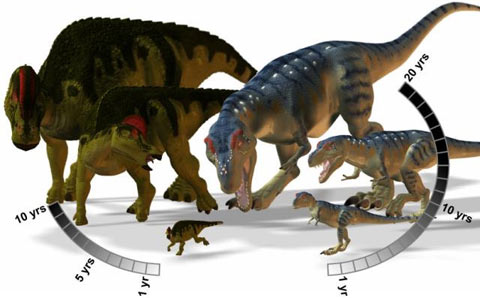Eating dinosaurs defends themselves by growing fast
Without a hard shell like iron to protect the body, plant-eating dinosaurs are forced to increase their body sizes to survive. In adulthood, they grow faster than carnivorous dinosaurs at least three times.
In the 10th year of life, the body length of Hypacrosaurus stebingeri - a plant-eating dinosaur - reaches 9 m from the nose to the tail tip. Meanwhile, the body length of tyrant Tyrannosaurus rex is relatively modest when they reach the same age. Their bodies only reach that length when they are between the ages of 20 and 30 years.
According to scientists at Kent State University (USA), the size difference forces predators to attack unborn adults Hypacrosaurus stebingeri .
Lisa Noelle Cooper, a doctoral student at Kent State University, said: 'When a Hypacrosaurus stebingeri reaches adulthood, I think it won't be afraid of predators. But when Tyrannosaurus rex's body reaches its maximum size (about 12 m), that's not true anymore. '

Hypacrosaurus (left) has a faster rate than Tyrannosaurus rex carnivores (Photo: LiveScience)
Cooper and her colleagues compared data on the evolution of Hypacrosaurus stebingeri with three predatory dinosaurs. They all lived in the late period of White Pollen - 65 to 100 million years ago.
For the Hypacrosaurus stebingeri , Cooper's team analyzed their leg bones and counted their growth rings (about one year each in life). The dinosaur Cooper studied at age 13 when he died.
'The Hypacrosaurus stebingeri grew three to five times faster than carnivorous dinosaurs of its age. When the leaf-eating animal grows fully, the body of the new Tyrannosaurus rex reaches its maximum size. That is a big difference in size. '
Hypacrosaurus also entered the estrus age earlier, in the second or third year of life, the researchers said.
'It is a beneficial point in survival warfare with predators. If the plant-eating dinosaurs were killed, the Hypacrosaurus species would not fall into extinction, because the females would have given birth to other children. '
- Fast food makes you fat
- Fossil discovery of new dinosaurs
- Arctic dinosaurs are only 20 years old
- Dinosaurs used to live in the water
- Erotic dance of carnivorous dinosaurs
- What did the old dinosaur eat? It turns out their menu is
- Newborn dinosaurs are only about one-third the size of a human being but have a very fast speed
- Animals push back dinosaurs to eat meat with a tail
- Lying mating mate of thorny dinosaurs
- 10 weird, hard to imagine dinosaurs
- Hybrids create pet dinosaurs
- Dinosaurs heat the Earth?
 Discovered an ancient centipede fossil 99 million years old
Discovered an ancient centipede fossil 99 million years old Discovered bat-like dinosaurs in China
Discovered bat-like dinosaurs in China Discovered a 200-year-old bronze cannon of the coast
Discovered a 200-year-old bronze cannon of the coast Discover 305 million-year-old spider fossils
Discover 305 million-year-old spider fossils Detecting Greek mummies in coffins with lead
Detecting Greek mummies in coffins with lead  King Tutankhamun may have a daughter
King Tutankhamun may have a daughter  The Austrian people celebrated the prehistoric female Guard
The Austrian people celebrated the prehistoric female Guard  Retrieved the 2,500-year-old Greek ship at the Sicilian coast
Retrieved the 2,500-year-old Greek ship at the Sicilian coast  Sahara used to be green and inhabited
Sahara used to be green and inhabited  The eternal beauty of earrings of 2,500 years old
The eternal beauty of earrings of 2,500 years old 